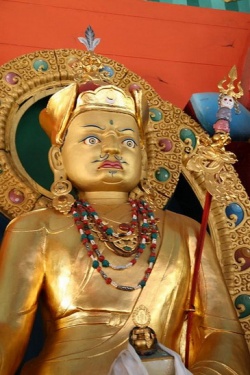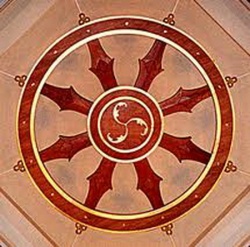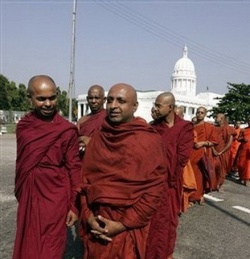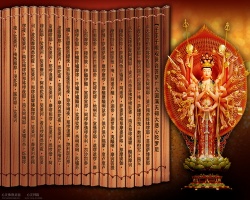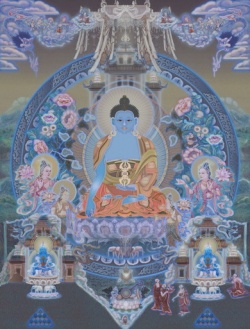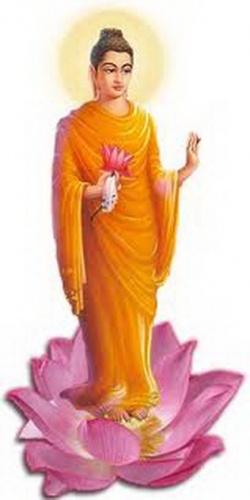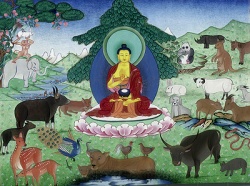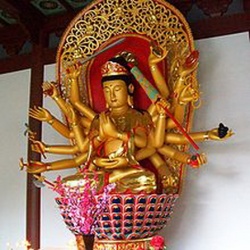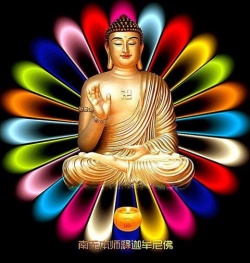The Two Selves. Or, the empirical self (namo-rupa, anatta), and the Spiritual (attan) Self. Destroying more lies and ignorances
The Two Selves
Or, the empirical self (namo-rupa, anatta), and the Spiritual (attan) Self
The greatest fool in Buddhist doctrine was one who “saw Self (atman) in (mere) self (anatta)” (“anattani ca attati”) [AN 2.52], certainly one of the most common refrains in Buddhist sutta.
Some of the greatest harbingers of the incapacity to differentiate the empirical (namo-rupic) self from The Self are most certainly the ‘Buddhists’ who never end in revelry of quoting Gotama to the effect that all ‘phenomena are Selfless (anattoti)’.
The empirical self is = anatta, [SN 3.196], that very khandic (namo-rupic) self which modern ‘Buddhism’ alone acknowledges, but not that other Self which is the “light and refuge” [DN 2.154].
What has Buddhism to say of the Self? "That's not my Self" (na me so atta); and the term "non Self-ishness" (anatta) are predicated of the world and all "things" (sabbe dhamma anatta); identical with the Brahmanical "of those who are mortal,
there is no Self/Soul", (anatma hi martyah), [SB., II. 2. 2. 3]). [KN J-1441] “The Soul is the refuge that I have gone unto”. For anatta is not said of the Self/Soul but what it is not.
There is never a ‘doctrine of no-Soul’, but a doctrine of what the Soul (The Self) is not (form is anatta, feelings are anatta, etc.). It cannot be denied that what is anatta is indeed the mere and petty self for [SN 3.196],
and countless other passages, the mere self of psycho-physicality is = anatta = khandhas; that same self which the disciple is instructed to have his will (ctta) reject in the face of illumination and insight.
Of the Metaphysician, the common-fool (puthujjana) who knows “only of his self, is fated to most certainly die when his time comes”, but of that noble Aryan sage who has claimed the summit of wisdom
and is “freed the will/nous (cittavimuttati)”, he is a “dead man walking”; meaning he has “died to that mere self and lives in The Self”.
Such a person in quest for same is commanded “die before ye die!”, or that before physical death come and lest you still suffer the delusion of The Self to be this (foul) self of flesh and bone you have dispirited and disobjectified the will (Self-assimilation = Atman) in upon itself (samadhi, liberation).
The common fool who ruminates over immortality envisages the survival of the personality (of person so-and-so; Bob, Sue); confusing the empirical self of “flesh, urine, blood, bone, feces” [Dhm] with the Spirit (atman).
This empirical self is in doubt by none, that very same self “headed to the grave” and which “goes in its own time”. The Metaphysician knows that any ‘self’ created in time must also perish in those same (“fires of”) time. [Dhm. 147]
"Behold! That painted puppet this body, riddled with oozing sores, an erected façade. Diseased heap that fools fancy and swoon over”; of which Buddhism in no way quarrels with modern and corrupt ‘Buddhism’, that of which this very self,
the temporal phenomena of that person so-and-so is equally as much ‘dukkha, anicca, and anatta”.
The ‘reflexive position’ taken by illogical modern ‘Buddhism’ proclaims the Pali term Attan (Skt. Atman, Self) to be merely a reflexive term meaning “oneself, himself, herself”,
however the reflexive and empirical mere self is, regardless of translation, “anatta” i.e. “na me so atta” (not my Soul), or also “eso khandhassa na me so atta” (these aggregates [[[forms]], feelings, perceptions, experiences, consciousness =mere self) are no the Self, the Soul).
As pertains the reflexive self, of who proclaim “myself, himself, herself” we are referring to “that person so-and-so (Larry, Sue, etc.)”, the empirical and psycho-physical (namo-rupa) self of blood and sinew which is “doomed to fall into the grave at long last”, the very same self the poetic dead are said to cry out to the living “what you are, we (the dead) once were,. what we are you shall be!”.
Even more illogical is the double standard of commentarialist and sectarian ‘Buddhists’ who desire anatta to mean ‘no-Soul’ as well as atta to mean simply ‘myself, himself, herself’; wherein illogically atta in the adjective anatta is, to their ignorant minds = Soul (‘no-soul’),
but atta in standalone = ‘myself’.
As illogical an end result, modern Buddhism has proclaimed atta = anatta! Its quite hard to fathom any position more senseless than this, however this is one of the countless reasons modern ‘Buddhism’ is illogical without end.
However doctrinally and logically so, what IS anatta (the five psycho-physical aggregates of the mere self) are indeed ‘myself’, in so meaning the mortal (mata) self composed of the bodily humors which is fated to death.
That mere self is never implied nor meant when Buddhism speaks of immortality and the path leading to same (amatagamimagga) [SN 5.9], of which “the body cannot pass that gate to fare beyond,..only the Soul (The Self)” - Homer
The great dictum of the Upanishads is “That (Brahman) thou art” (tat tvam asi).
“That” is here, of course, the Atman or Spirit, Sanctus Spiritus, the Greek pneuma; this Atman is the spiritual essence, impartite whether transcendent or immanent; and however many and various directions to which it may extend or from which it may withdraw, it is the unmoved mover in both intransitive and transitive senses.
It lends itself to all modalities of being but never itself becomes anyone or anything. That than which all else is vexation- That thou art.
“That”, in other words, is Brahman, or Godhead in the general sense of Logos or Being, considered as the universal source of all Being. That which is “in” him as the finite (1) in the infinite (2- infinity, i.e. phenomena, namo-rupa), though not a “part” of him.
Referring back to "of those who are mortal, there is no Self/ Soul", the common fool doesn’t 'have' an atman as such that we might agree with heretical modern ‘Buddhism’ which denies Selfhood in the absolute;
for those same peoples who, in the grand bloom of ignorance, accept the foul self and deny the Great-Self, they are objectively (self-khandhas) assured that no underlying Subject (The Self) is immanent, or transcendent.
Just as a man might have gold on his land, undiscovered and unknown, he has no gold, no wealth, even though it be his by measure of being present upon his very lands;
so too those common fools (puthujjana), the ‘Buddhists’ who are certain and proud in their ignorance that this temporal personality, this self, is all there is.
Theravada, in great illogic, goes one further to say that Gotama’s denial of nihilism (ucchedavada) was aimed at meaning that even the empirical self, since it itself was merely a composite and temporal construct, had no existence to be annihilated;
thereby subverting the doctrinal ‘heresy of nihilism’ to be placed upon the view of denying the empirical self rather than The Self, the Atman. Of course, to ‘have an atman’ implies possession, and certainly so the immanent Subject,
The Self, is a possession by nothing and by nobody;
in this too the wiseman agrees with the common materialist who ignorantly proclaims “I don’t have an atman/Soul”, most certainly that foul self does not ‘have’ The Self any more so than that object which is illuminated from afar ‘has (of itself) light’.
“There are two within us” [[[Wikipedia:Plato|Plato’s]] Republic 439d, 604b]; in the expression of “self-control” implying that there is one that controls and the other (self) subject to control,
for we know that “nothing acts upon itself”; for the one self “becomes”, and the other self “is”. “The ‘fair’ self (kalyanam attanam)…the ‘foul’ self (papam attanam)” [AN 1.149]; i.e.
the “great Self” (mahatta) and the “petty” (appatumo) [AN 1.249], or that “self whose Lord is the Self” [Dhm 380].
In that modern so-called Buddhism has denied The Self, it has constructed an illogical impossibility in thereby positing empirical purity of which the doctrine of Buddhism itself, not to mention logic alone most heartily protests, for there is no possibility of empirical purity within the teachings of Buddhism.
It is of course true that the Buddha denied the existence of the mere empirical “self” in the very meaning of “my-self” (this person so- and-so, namo-rupa, an-atta), one might say in accordance with the command ‘denegat seipsum,
[Mark VII.34]; but this is not what modern so-called Buddhism means to say,
or are understood by their readers to say; what they mean to say is that the Buddha denied the immortal (amata), the unborn (ajata) and Supreme-Self (mahatta’) of the Upanishads.
And that is palpably false, for he frequently speaks of this Self, or Spirit (mahapurisha), and nowhere more clearly than in the too often repeated formula 'na me so atta’,
“This/these are not my Soul” (na me so atta’= anatta/anatman), excluding body (rupa) and the components of empirical consciousness (vinnana/ nama). "What of this short-lived body which is clung to by means of craving?
There is nothing in it to say ‘I’ or ‘mine’ or ‘me’." [MN 1.185]. "What do you suppose, followers, if people were carrying off into the Jeta grove bunches of sticks, grasses, branches, and leaves and did with them as they wished or burned them up, would it occur to you:
These people are carrying us off, are doing as they please with us, and are burning us? No, indeed not Lord.
And how so? Because Lord, none of that is our Soul." [MN 1.141]. “What do you think, is form lasting or impermanent? Impermanent Gotama.
Is that which is impermanent suffering or blissful? Indeed its suffering Gotama. Is that which is impermanent and suffering and subject to perpetual change; is it fit to declare of such things ‘this is mine, this is what I am, this is my Soul? Indeed not Gotama!” [MN 1.232].
Buddhism’s command, same as that of Plotinus and the Pythagoreans before him, was the utter disobjectification of the will by inversion of that primordial attribute which is uncaused and without beginning (attribute/avijja).
For only the wise and illuminated fully know the two selves, differentiate the two by means of wisdom with which they are endowed, and certainly do not see “Self in what is (mere) self (anatta)”.
Source
https://groups.google.com/forum/#!topic/talk.religion.buddhism/ZmIL4e9EIDE
